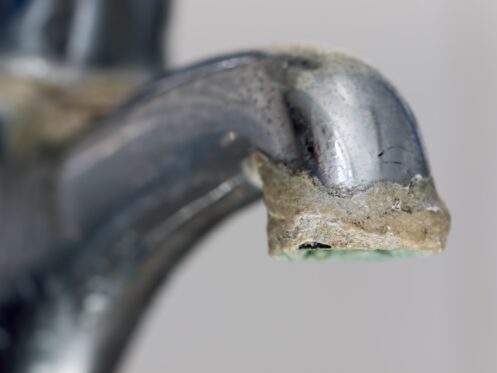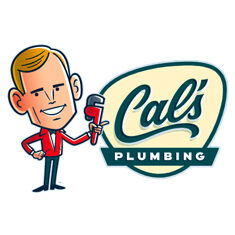Water ranges from soft to hard on a scale, which reflects the amount of minerals like calcium and magnesium it contains. The groundwater in much of Arizona is naturally hard, which means your home or business likely has hard water. That’s true whether you get water from a well or a municipal supply. While hard water is generally safe to drink, it can cause issues with your plumbing system. In fact, the Department of Energy (DOE) estimates that it costs the average household about $800 annually. Let’s explore where those added expenses come from.
Reduced Water Pressure
Hard water can leave behind calcium carbonate in the form of limescale. This can occur when water is still, heats up, or evaporates. The scale left behind at any given moment is microscopically thin. The problem is that these layers continue to accumulate over time. With each new layer, the diameter of a pipe shrinks. Since less water can pass through the pipe, water pressure declines. You can feel the effects of this throughout your home, including less forceful water from your showerheads, kitchen faucets, and bathroom faucets. There are ways to remove scale buildup, including hydro jetting and chemical cleaning agents. That said, affected pipes often require replacement, so prevention is preferable to treatment.
Corrosion and Other Pipe Deterioration
Limescale not only reduces water pressure but can lead to corrosion, and this can happen in several ways. The scale has a rough surface that can trap reactive agents and lead to localized corrosion. The slower water movement can help promote this kind of corrosion as well. Chlorides and other aggressive agents can remain between the scale and the pipe. That allows the agents long-term exposure, which wouldn’t otherwise be possible. Limescale can also act as an anode and promote electrical corrosion due to how other water chemicals react to it.
Valve and Seal Wear
Scale can clog valves and lead to premature replacement. It can also cause various plumbing seals to break down faster than they otherwise would. This can lead to small leaks that go on for a long period before homeowners discover them.
Clogged Drains
Scale can buildup in your kitchen and bathroom drains as well. While it won’t usually accumulate enough to cause a clog itself, it can result in problems in other ways. The scale reacts with soap and other detergents to create a scum, which can harden and build up over time. That scum can also trap other materials, such as grease, food particles, and hair. Limescale-related obstructions can cause unpleasant smells and slow drainage and eventually lead to standing water and unsanitary conditions. Snaking the drain can clear the clog but won’t usually remove the scale. That may mean the drain is prone to clogging again in the future.
Kitchen and Bathroom Fixtures
The buildup of scale within your fixtures can lead to localized low water pressure. The scale can clog screens and aerators, and it can lead to unpleasant smells and discolored water. O-rings, washers, and other seals, including those in sink faucets, will tend to break down faster. Often, this kind of deterioration will lead to the need for premature replacement of bathroom and kitchen fixtures. It can also affect shower heads and garbage disposals.
Lower Water Heater Efficiency
Plumbers recommend annual water heater maintenance at a minimum, and hard water is a key reason. In tank-based systems, scale can build up in the tank and lead to increased pressure. Heightened pressure decreases system efficiency and leads to increased electricity or fuel consumption. In both tank and tankless systems, scale can build up on components. This is particularly notable wherever it can act as an insulator. Scale on heating elements, for instance, interferes with the heat exchange and dramatically reduces efficiency. The DOE estimates that efficiency reduction can be as high as 15%. This is why plumbers recommend at least annual flushing of tank-based systems and annual descaling of on-demand systems.
Decreased Water Heater Lifespan
Hard water can make a water heater more prone to failure. Scale can clog pipes, tubes, and valves that then require replacement. It also leads to premature failure of thermostats, heating elements, heat exchangers, and many other components. Scale also builds up on the inner tank wall and is among the top causes of leaks. The Water Quality Association (WQA) performed a broad, long-term study that tested the effects of scale on appliances. It found it cut water heater life by 50% on average. That may explain why some homeowners have water heaters that last only 6-8 years rather than the expected 15.
Decreased Lifespan of Other Water-Using Appliances
The WQA research extended beyond water heaters. The researchers found a similar loss of lifespan among hot water and steam boilers that some homes use for heat. Dishwashers and washing machines lost about four years of average life from hard water. In many cases, moderately hard water may not warrant a whole-house system to protect all your plumbing. However, you can still safeguard sensitive appliances with localized anti-scale devices.
Decreased Appliance Efficiency
Decreased energy efficiency due to hard water occurs among appliances as well. For instance, dishwashers and washing machines use more electricity when experiencing issues due to hard water. There are other added costs to consider as well. Detergents don’t function as well with hard water due to how they react with minerals. Many people will compensate by using more of the product than the manufacturer recommends.
Hard Water Solutions
The $800-a-year estimate is why the DOE recommends water softening as a worthwhile investment. The right solution will easily pay for itself over the life of the equipment. There are two main approaches to dealing with hard water: template-assisted crystallization (TAC) and ion exchange.
TAC systems chemically change the calcium and magnesium in water so that they can’t form into scale. While whole-house TAC systems are available, they can be impractical and expensive. Typically, the industry uses TAC in homes for targeted applications. Examples include anti-scale devices for water heaters and water conditioners for showerheads.
Whole-home water softeners generally employ ion exchange. They work by exchanging the calcium and magnesium in the water with salt, either sodium or potassium chloride. The benefits of this approach are that it removes the minerals from the water and affects the entire home. There are systems with flow rates high enough to meet the water demands of the largest households. You can also opt for a dual-tank setup for uninterrupted water softening. A tank can recharge as needed while the other tank continues providing soft water.
Enjoy Soft Water in the Greater Tucson Area
Cal’s Plumbing is a plumbing contractor that’s served homeowners throughout Tucson and the surrounding areas since 1948. Our plumbers can repair deterioration caused by hard water, including repairing and replacing damaged pipes. We also install and service systems that can protect you against hard-water-related problems in the future, such as a water softener. Contact us today to schedule an appointment for water treatment solutions with one of our experienced plumbers.






